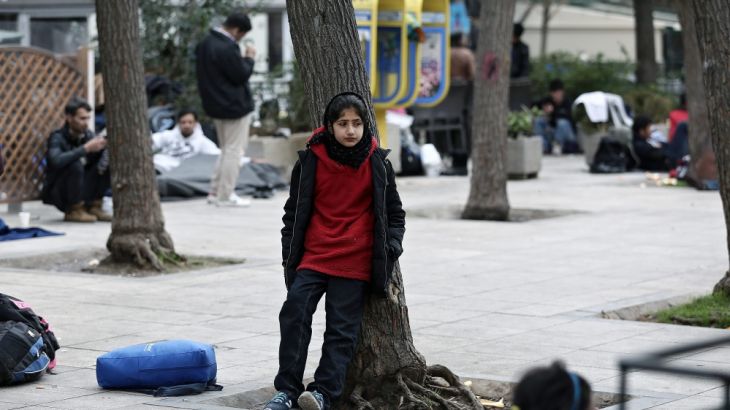The booming fake passport market for refugees in Athens
People smugglers and their middlemen take advantage of huge influx of refugees camped out in Greek capital.

Victoria Square in Athens – a public park in a grubby neighbourhood of the Greek capital – is slowly turning into a temporary refugee camp.
The majority of the hundreds of refugees vying for limited space in the square are Hazaras, an ethnic minority who have long suffered persecution in Afghanistan.
Keep reading
list of 4 itemsUN report charts lethal cost of migration over past decade
Conflict, climate, corruption drive Southeast Asia people trafficking: UN
Bodies of three Rohingya found as Indonesia ends rescue for capsized boat
There are a few Syrian, Iranian and Pakistani in their midst, but they are here with the tacit approval of the Afghanis who have already chased refugees from Somalia, Sudan and Eritrea out of the square.
|
|
The borders leading out of the country have closed down one by one, leaving Greece in danger of becoming what its prime minister, Alexis Tsipras, recently described as a “warehouse of souls”.
Inundated by the influx of trapped refugees that was at the last count at least 25,000, the Greek state is clearly absent from Victoria Square, a once upmarket area of Athens that has now sunk into disgrace.
Drug dealing and prostitution are rampant here. There are no public facilities and soiled nappies are scattered on the pavement next to bins overflowing with rubbish.
For some, these desperate refugees are a business opportunity.
The cafes around Victoria teem with human smugglers, their middle men and negotiators. The unfolding disaster of stranded refugees is a booming business for them. They keep making their money as war and government failures guarantee a steady supply of the uprooted and desperate.
READ MORE: Refugees attempt suicide by hanging from tree in Greece
“If you stay here for just five minutes you will be approached by someone offering to take you to any country of your choice in Europe for a fee. I am sure they are doing this illegally,” says Mohammed, an Iranian migrant.
As restrictions at the northern border continue, a growing number of refugees are turning to the criminal gangs selling forged passports. Many want to avoid the long and dangerous journey by land and sea to reach northern Europe.
Armed with a hidden camera, we set off to find a smuggler willing to sell me a fake passport. Through refugee contacts we were led to a smuggler from South Sudan.
We met him at another park popular with the refugees and migrants. He took two passport photos from me and asked us to wait for his call.
Later in the evening he turned up with a British passport which he said would cost us 350 euros ($386). But before my photo was laminated into it, the smuggler wanted his money.
It’s at this point we decided to stall the process as we didn’t want to be party to the commission of a crime
“I will pay you at 10am tomorrow morning and pick the passport from you,” I told him.
The tall and fidgety smuggler would have none of that though.
“You have to give me something, a deposit,” he said. “I cannot start working on the passport until you pay. The photo is scanned in. It’s done by laser printer. I swear this is what you need to get to London.”
I politely declined and asked him to meet us again the next morning.
He kept calling the next day, but we didn’t respond.
The smuggling business in Athens is a vast industry with many layers. Even Greek police acknowledge they face an uphill struggle against the smugglers.

The fake passports they sell range in price from the easiest to forge to the hardest. The Spanish passport, at a cost of $250, is the cheapest. A French or US passport is about $3,000.
Counterfeit passports often include pages filled with fake visa stamps to add an air of authenticity. Some forgers, we were told have even mastered the ability to re-create holograms, a security feature of many passports.
It’s not everyone who can afford to buy fake passports.
Those unable to buy the documents are forced to walk through unofficial crossings into Macedonia and beyond.
Thousands are on the move every day. It’s the hope of being closer to a new life that many of the refugees say keeps them moving.
Their past has been destroyed – so now, they continue to seek a future.